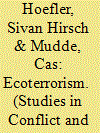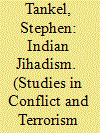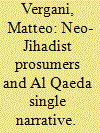| Srl | Item |
| 1 |
ID:
132880


|
|
|
|
|
| Publication |
2014.
|
| Summary/Abstract |
This article examines the phenomenon of "ecoterrorism" from a conceptual and empirical perspective. We explore the political and academic debates over the meaning and use of the term ecoterrorism, and assess the validity of the concept of "ecoterrorism" and of the alleged threat of the Radical Environmentalist and Animal Rights (REAR) movement by analyzing the characteristics of both the movement and its actions. Our analysis shows that the term ecoterrorism should only be used for a small proportion of the actions of REAR movement. Consequently, counterterrorist measures should only target these terrorist minorities, rather than all groups and the broader movement.
|
|
|
|
|
|
|
|
|
|
|
|
|
|
|
|
| 2 |
ID:
132879


|
|
|
|
|
| Publication |
2014.
|
| Summary/Abstract |
India has been confronting jihadist violence for decades. Although expeditionary terrorism by Pakistani militants typically receives the most focus, indigenous actors, many benefitting from Pakistani support, are responsible for the majority of jihadist attacks in India. Yet the dynamics of Indian jihadism remain under-explored. This article examines the Indian Mujahideen (IM), which constitutes the primary indigenous jihadist threat. It argues the IM is best understood as a label for a network of modules, with a loose leadership, that is connected to smaller, self-organizing clusters of would-be militants as well as to foreign militant groups like the Pakistani Lashkar-e-Taiba.
|
|
|
|
|
|
|
|
|
|
|
|
|
|
|
|
| 3 |
ID:
132878


|
|
|
|
|
| Publication |
2014.
|
| Summary/Abstract |
While the use of targeted killings by the United States and Israel has received the most press coverage, Colombia has also utilized targeted killings in its conflict with the Revolutionary Armed Forces of Colombia (FARC). Utilizing an original dataset, this study quantitatively gauges the effectiveness of Colombia's targeted killing program, by examining the influence of FARC leadership deaths upon the number and severity of FARC attacks during the years 2004 to 2011. The results suggest that the Colombian government's killing of FARC leaders has been effective in decreasing the number of attacks, but not the severity of attacks
|
|
|
|
|
|
|
|
|
|
|
|
|
|
|
|
| 4 |
ID:
132881


|
|
|
|
|
| Publication |
2014.
|
| Summary/Abstract |
Scholars in the field of terrorism and violent extremism often refer to the so-called Al Qaeda single narrative. This article suggests that the Internet challenges the existence of a "single narrative," by arguing that neo-jihadist prosumers may reinterpret Al Qaeda's narrative and create hybrid symbols and identities. The article discusses the case study of an Italian neo-jihadist allegedly killed in Syria, Giuliano Delnevo, presenting research on his YouTube and Facebook production. Delnevo's narrative, which emerges from the diverse messages circulating on the Internet, recasts the Al Qaeda narrative by hybridizing it with other cultural backgrounds and political symbols.
|
|
|
|
|
|
|
|
|
|
|
|
|
|
|
|